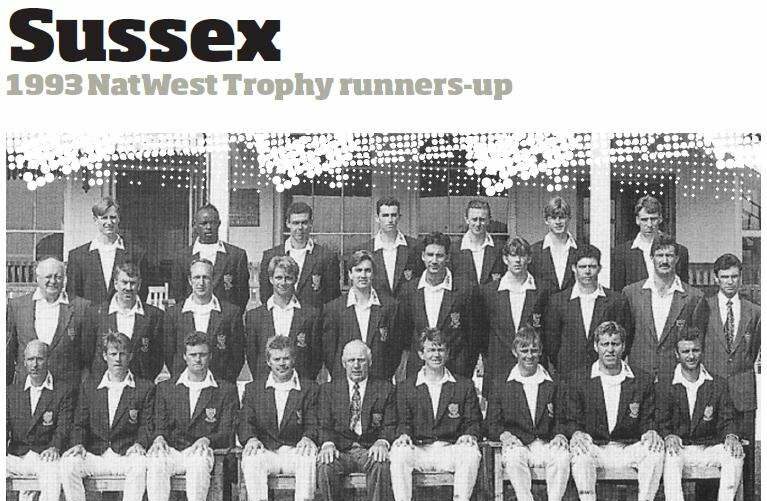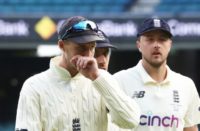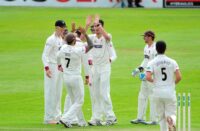By Neil Fissler
Ed Giddins admits the 1993 NatWest Trophy final against Warwickshire still causes him to wake up at night in a cold sweat.
Between innings, Sussex were 7-1 on with Ladbrokes to win the trophy after posting a record 321 – the highest score in a one day cup final up to that point.
It was mainly due to opener David Smith, who scored an unbeaten 124 after Dermot Reeve had won the toss and put them into bat.
But what was about to unfold over the next 60 overs was at the time something of a fantasy as Warwickshire, in the murk of a September dusk, chased down the seemingly impossible target.
Giddins believes that it took a hugely talented Sussex a couple of seasons to get over that result while Warwickshire, who signed Brian Lara the following season, went from strength to strength.
“It would have been better to lose that game by 150 runs than to lose it off the final ball,” Giddins said. “Warwickshire went on to win three of the four trophies the following year.
“And Sussex, we had a hangover from that game the following season, it was that much of a disappointment. It didn’t just affect the club, it affected us all for a good season or two after that, mainly because the game was played in the first week of September and I don’t think we had too much cricket after that.”
The bookmakers appeared to have got the odds spot on when Warwickshire needed to take 21 runs off the final two overs.
Giddins went for just five runs as he bowled the penultimate over, thought that the trophy was heading back to Sussex until Roger Twose took two through the covers off the last ball.
“They needed 21 off the last two overs and I went for five,” Giddins confirmed. “I had Asif Din caught out on the boundary by Martin Speight.
“Warwickshire needed to get 16 off the final over in the dark and I thought that we were home and dry, I must admit.
“But Dermot Reeve was one of the most mentally strong cricketers in the world at that time. I think he was named man of the match in three of the six finals he played.
“And he got the better of the great Franklyn Stephenson that day for sure. One thing I always remember about that game was looking up at the digital scoreboard.
“It gave the runs per over and when Warwickshire went out to bat it was just a little over 5.30 per over and they always kept within that. It’s now the equivalent of 450.
“I believe it gave the chasing team a psychological edge because a lot of people don’t quickly do maths in their head but at just over five an over you can keep the board ticking over.”
Ed Giddins can be contacted through http://www.fulleventmanagement.com
(Players only)
BACK ROW (left-right):
Brad Donelan: An all-rounder lives in Neston, Cheshire, has been a cricket professional at Uppingham and Birkenhead Schools and now delivers PE lessons in primary schools.
Carlos Remy: A seamer is now living in Chingford, East London, and works as a fitness instructor.
John North: An all-rounder is now living in Chichester and is an electrician running his own business, Slindon Electrical Services.
Keith Newell: Batsman and former head coach at Glamorgan before becoming director of cricket at High Wycombe CC. He is now Head of Cricket St Benedict’s School, London.
Shaun Humphries: The wicket keeper is now the director of a Worthing-based building company Pierview Building Contractors.
Toby Peirce: A batsman coached in South Africa but for the last 11 years has been running Quaff Fine Wine Merchant in Hove.
Jacob Dean: A spinner lives in Twicknham, Middlesex, and works as a sales rep.
MIDDLE ROW:
Eddie Hemmings: An England off spinner has run a village shop in West Butterwick, North Lincolnshire, and is now a groundsman at Caythorpe CC.
Bill Athey: A former England batsman who played football for Brentford reserves is now a housemaster at Dulwich College where he also coaches football and cricket.
Martin Speight: A batsman who is now head of hockey and cricket at Sedbergh School, he also hosts a summer cricket academy and is an accomplished artist.
Ian Salisbury: The former England leg-spinner was first team coach at Surrey and is now on the staff of ECB working as specialist spin bowling coach to the England women’s team.
Ed Giddins: An England fast bowler became a professional poker player and now runs an event management company from his base in East Sussex.
Jamie Hall: The opening batsman is now head of London and the South East for Posturite a company specialising in office furniture.
Keith Greenfield: A batsman who stayed on at Sussex as Academy director and in January 2016 was appointed Director of Cricket.
Ian Waring: A seamer who became assistant coach at Sussex and is now Operations & Facilities Manager at Hove.
FRONT ROW:
Chris Waller: A spinner who coached at both Sussex and Surrey and is now working for Ardingly College.
Peter Moores: A wicket keeper who went into coaching and has coached England in two separate spells. He is currently a coaching consultant with Nottinghamshire CCC.
Adrian Jones: A paceman who also served Somerset has spent the last 14 years as the owner of Solus, an independent corporate office supplier.
Colin Wells: The all rounder brother of Alan who played in two one-day internationals for England is the Director of Cricket at the British School Al Khubairat in the UAE.
Alan Wells: An England batsman ran a bed and breakfast but is now director of cricket and house tutor at St Bede’s School in Sussex.
Tony Pigott: An England international seamer was Sussex’s chief executive and is now an ECB Pitch Liaison officer and is also sales and marketing director of the Turf Club.
David Smith: England opening batsman who coached at Sussex is now the director of an engineering company.
Neil Lenham: An opening batsman, the son of Sussex stalwart Les, worked on the county’s commercial operation and was managing director of Newbery. He now coaches at Bede’s School.
This piece originally featured in The Cricket Paper, Friday August 26 2016
Subscribe to the digital edition of The Cricket Paper here












